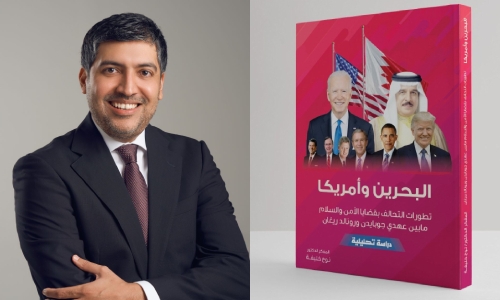Bahraini press frameworks on Biden’s Iran policy highlights solidarity between US and Bahrain
TDT | Manama
The Daily Tribune – www.newsofbahrain.com
In his scientific study ‘Bahrain and America: Developments of the Alliance in Security and Peace Issues Between the Reigns of Joe Biden and Ronald Reagan’, researcher Dr Nooh Khalifa highlighted the importance of America’s control of the Iranian regime’s multiple wars in the Arab region, which aim to protect Iran’s escalating nuclear military ambitions.
Dr Nooh indicated that the extensive coverage of Bahraini newspapers on US President Joe Biden’s policies towards the Iranian threats in the region formed a fertile field of effect that adheres to the course of long-standing historical Arab-American relations of solidarity in addition to requirements of major powers in the region – which include undermining developments of the Iranian nuclear program and transgressions.
“The press materials that highlighted the Iranian expansionist and missile chaos formed factors that pushed the direction of security solutions towards new alternatives,” stated Dr Khalifa. “These materials recorded a percentage close to the percentage registered for content highlighting nuclear negotiations – which occupied the top position – and included attempts to influence the course of President Biden’s policies.”
“The majority of press material published in Bahraini newspapers on Iranian threats during President Joe Biden’s era focused on the negotiations of the nuclear program as a major focus for changing America’s policies in the region – with a percentage of 41.3%.”
“The content that focused on Iranian threats – which formed factors tending towards new alternatives for security solutions – occupied the second rank with a rate of 34.9%.” Dr Khalifa also added that content focused on lifting sanctions ranked third as determinants of confidence in Washington’s policies at 23.8%.
According to Dr Khalifa, the study revealed that 49.2% of the press material published in Bahraini newspapers about America’s policy towards Iranian threats – under US President Joe Biden – employed strategic frameworks to highlight the importance of an early reciprocal pace of solidarity between the Biden Administration and the Gulf states. He added that this preserves the intertwined national security interests between both nations who are historically linked by economical and security interests.
“This became evident as the newspapers highlighted President Joe Biden’s tendency to consult with allies and put additional restrictions after returning to the nuclear agreement,” added Dr Khalifa. “President Joe Biden’s national security advisor – Jake Sullivan – stressed the importance of negotiating Iran’s pre-nuclear missile program in addition to warnings by officials of Iranian chaos.”
Dr Khalifa highlighted the importance of the Gulf States’ direction to control Iran’s expansionist wars in Arab regions backed by its missile power within efforts to protect its nuclear ambitions. He also highlighted the importance of America’s efforts to control Iran’s nuclear transgressions on two parallel levels.
“27% of the press material used conflict frameworks to highlight the escalating danger of the Iranian regime against Israel and America after the failures of favoring the nuclear agreement in 2015 under the Obama administration,” added Dr Khalifa. “The conflict framework highlighted the warning of 2,000 retired Israeli military officials against rushing to the nuclear agreement because it failed to undermine Iran’s terrorism, halt uranium enrichment, and endangered Israel.”
“Iranian military chaos also threatened American interests in the region seen through the attack on the American military bases and the threats to carry out retaliatory attacks such as the assassination of former US President Donald Trump.” Dr Khalifa added that press material revealed the low aspirations of Gulf States regarding the ability of the nuclear agreement to reassure them.
He highlighted that there are prevalent fears of the Iranian regime’s recognition of US President Joe Biden’s negotiation tactics which allows Iran to achieve greater field progress and enforce military equations that limit available options.
He noted that 23.8% of press material published in Bahraini newspapers employed responsibility frameworks, calling forth anticipated security commitment from President Biden and prioritizing the undermining of the international Iranian regime. “An article published in the American Wall Street Journal stated that President Biden’s concessions to Iran and the Houthis turned Yemen into a theatre for Iranian colonial ambitions,” added Dr Khalifa.
“Another article also highlighted that 122 members of the US Congress called on President Joe Biden to condemn the behaviour of the Tehran regime against its people as well as the bombing of the Ukrainian airline with two missiles.” “25.4% of content published in Bahraini newspapers employed additional sub-headlines that highlighted Israeli stances against the Iranian nuclear transgressions that encircled the American direction and narrowed its scope.”
“The newspapers highlighted more details about President Joe Biden’s dealings with Iran’s nuclear program such as his intention to ease sanctions after commitment to the terms of the nuclear agreement.” “They also highlighted Israel’s insistence to prevent Iran from obtaining nuclear weaponry in addition to options to deter its threats.”
Dr Khalifa further highlighted Israel’s tendency to support imposing international sanctions and considering a nuclear-capable Iran an unacceptable challenge to it and to regional stability. He also noted Israel’s insistence that the agreement legitimized Iran’s standing on the threshold of becoming a nuclear state strengthened Israel’s position as an equal adversary to American power which took a diplomatic position.
In conclusion, Dr Khalifa highlighted that the contents he is presenting are the results of an analytical survey that he conducted on all press materials published in Bahraini newspapers from the first day of US Presidential elections until the end of the first five months of US President Joe Biden’s term in office.
He also moved forward to highlight the image of US President Joe Biden during his presidential campaign which he ran against his opponent Donald Trump.
Related Posts

